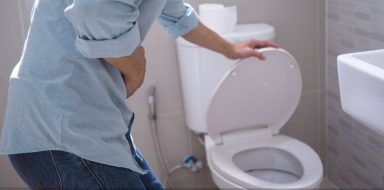Finding Balance
Well, it's official. Your symptoms aren’t going to “just go away.” No pill is going to magically “fix” you, and the cause isn’t an infection or a virus. Nope. It’s an overactive bladder (OAB) and it’s here to stay.
When people ask you about your symptoms or how you are doing with the changes, you probably deliver fairly convincing replies like, “It’s not so bad,” and, “I do what I can with it.” Let’s face it though, in many ways, OAB stinks. It royally, terribly, super duper stinks.
It stinks because of the physical changes obviously, but OAB is also devious in the other ways that it creates problems in your life. OAB makes you feel angry, sad, confused, discouraged, anxious and embarrassed. For many, the emotional changes are worse than the physical.
You have to care for both the emotional and the physical aspects of OAB because when one is left untreated, it negatively affects the other. So, if you are following your doctor’s recommendations perfectly but you don’t deal with growing depression, your OAB is not going to be managed well.
Check in with your doctors for the best physical recommendations and this article for the best mental health recommendations.
Stress Preface
Imagine a major highway. All of the cars on the highway represent stress, and OAB builds the cars and puts them on your highway. The more stress, the more congestion you have on the highway so cars begin taking exits. Each exit is a negative feeling. There is the depression exit, the anger exit, the embarrassment exit and so on. More cars on the highway lead to more cars on the exits.
All of the built-up stress in your life comes out one way or another. The trick is finding ways to limit the stress to avoid the build-up, and then finding measures to deal with the repercussions of the anger, depression, embarrassment and anxiety that follow.
Stress Relief
Reducing stress is so natural and simple that it should go without saying. But unfortunately, it does need saying because so many people are seeking out the wrong types of stress relief. When you want to relax, what do you do? Do you head for the couch? Do you sit with your phone and get sucked into the black hole of social media?
This may come as a big surprise to you, but your relaxation is all wrong. Watching TV does not give you the relaxation that you seek. Playing video games or browsing around online doesn’t either. These examples are nice for avoidance and escapism, but they should only be used in small doses and not with consistency.
So, what do you think? What makes you happy? TV doesn’t make you happy. What gets you feeling energized and refreshed? Not staring at your phone. What about meeting up with friends? What about preparing a special meal? What about exercising or going for a drive with the windows down and the radio up? These are the types of things that truly serve to rejuvenate and reinvigorate your mind and body. Seek them out and do them more often.
Did you know there are certain drinks to avoid with lymphoma? Read on to learn about how these can make symptoms worse, and what to avoid.
Depression/Anger Off-Ramp
Does it feel like a lot of your cars are getting off at the depression/anger exit? It may surprise you to see depression and anger lumped together at one exit, but it is not much of a stretch. Many mental health professionals treat depression and anger in the same way because of how similar they are.
Think about anger and depression as the same feeling in a different direction. When it is directed out towards the world, it is anger. When it is turned inward, it’s depression. In either case, the damage is real and lasting.
To lessen the unwanted impact of depression and anger in your life, you have to target the thoughts that trigger sadness and anger. For sadness, catch yourself feeling depressed. Once you notice that you are not feeling the way you want to feel, begin paying attention to what you are doing and what you are thinking. In depression, thoughts, feelings and behaviors all work in conjunction. By investigating all aspects, you can begin to change the way you feel.
Your thoughts might be telling you that OAB is the worst thing in the world and that your life is forever worse. That seems pretty depressing. Your behaviors might paint a picture of someone less active and adventurous than she used to be. Maybe staying at home for fear of incontinence cuts out your stress relievers. This ends in more depression.
The same is true with anger. If you catch yourself being angry, you can look into the thoughts and behaviors that are present. They might be making your anger worse. Changing your thoughts and behaviors gives you control to change your feelings. When dealing with OAB, the power is a welcome addition.
Embarrassment Off-Ramp
Feeling embarrassed is incredibly common for people with OAB. After all, sudden urges and leakages are embarrassing. Your quest to limit embarrassment needs to be two-fold. The first is to limit your symptoms. You can do this by taking practical steps like monitoring your fluid intake, doing bladder training, working on some Kegel exercises and having an extra set of clothes nearby. These practical steps can make a world of difference.
The second part of the embarrassment strategy comes with changing your thinking towards acceptance. Just like retraining your brain can reduce depression and anger, it can reduce embarrassment. Do you think someone undergoing chemotherapy should be embarrassed by their bald head? Do you think that someone in a wheelchair should be embarrassed that they cannot ascend a flight of stairs? Then why should you be embarrassed of your OAB?
It is part of your condition. It is something that you cannot completely control no matter how much you wish you could. By being kind to yourself, you can begin changing your level of embarrassment. Along the way, tell the people in your life about the risks of OAB to let them know what a night out with you can look like.
Anxiety Off-Ramp
Anxiety, panic and fear become major problems for people who have not tackled their depression or embarrassment issues with OAB. When depression builds, it transitions into extreme isolation and disconnection from the rest of the world. When embarrassment builds, it becomes a strong fear of leaving the home or entering a scary situation. This is where anxiety lives.
People with anxious symptoms will be reluctant to leave their security and will imagine terrible scenarios with certainty that they will become reality. The solution, once again, is quite simple. The best you can do is to turn off your brain, engage your legs and walk out the door. By going into the world and doing things outside of your comfort zone, your zone will grow. Yes, it will increase short-term anxiety, but the tradeoff is worth it.
To help boost your success out in the world, test out some relaxation strategies before you go. Deep breathing and guided imagery can work well to calm your body and your mind, but for OAB progressive muscle relaxation (PMR) is the best fit. It helps you gain awareness of your body and relaxes your physical tension with the bonus of strengthening your pelvic floor muscles when you incorporate Kegels into the routine.
You already know that OAB stinks. By gaining a better understanding of the emotional challenges you face, you become better able to handle the impact. This shrinks the overall emotional impact of OAB on your life.
Consider the above tips, and if you do, your stress highway will be free and clear.







